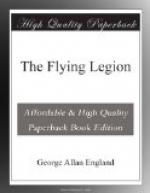“Nom de Dieu!” the Master heard him cry. “Mais, nom de—”
“What have you found, Lieutenant?” shouted the Master, letting the simoom drive him toward the wady. In their excitement none of the men would yet take cover, lie down and hide their faces under their coats as every dictate of prudence would have bidden. “Who is it, now? What—”
“Ah, my Captain! Ah! the pity of it! Behold!”
The Frenchman’s voice, wind-gusted, trembled with grief and passionate anger; yet through that rage and sorrow rang a note of joy.
“Tell me, Leclair! Who, now?” demanded the Master, as he came close and peered down by the fire-gleam roaring on the beach, sending sheaves of sparks in comet-tails of vanishing radiance down-wind with rushing sand.
“It is impossible, my Captain,” the lieutenant answered in French. His voice could now make itself heard more clearly; for here in the wady a certain shelter existed from the roaring sand-cyclone. “Impossible, but—Dieu!—it is true!”
“What is true?”
“Incredible, yet—voila!”
“In Allah’s name, Lieutenant!” the Master ejaculated, “compose yourself! Explain! Who is this Arab, here?”
“No Arab, sir! No, no!”
“Not an Arab? Well, what is he, then?”
“Ah, these scars, my Captain! Behold—see the slave dress, the weals of the branding-iron on cheek and brow! Ah, for pity! See the starved body, the stripes of the lash, the feet mangled by the bastinado! What horrible things they have done to him—ah, God have pity on us!”
Tears gleamed on the stern fighter’s cheeks, there in the ghostly blue firelight—tears that washed little courses through the dust and sand now griming his face. The French airman, hard in battle and with heart of steel and flame, was crying like a child.
“What now? Who is it?” shouted the Master. “A European?”
“Yes, my Captain! A Frenchman!”
“A Frenchman. You don’t mean to say it—is—”
“Yes, yes! My orderly! Lebon!”
“God!” exclaimed the Master. “But—”
A cry from Rrisa interrupted him, a cry that flared down-wind with strange, wild exultation. The Arab had just risen from the sand, near the unconscious, in-drifting form of the Sheik, Abd el Rahman.
In his hands he was holding something—holding a leather sack with a broken cord attached to it. This cord in some way had been severed by the Sheik’s rifle when the old man had fallen. The leather sack had rolled a few feet away. Now, with hands that shook so that the Arab could hardly control them, Rrisa was holding out this sack as he staggered through the blinding sand-storm towards his chief.
“Al Hamdu Lillah!” (Praise to the Lord of the Three Worlds!) choked Rrisa in a strange voice, fighting for his very breath. “See—see what I—have found!”
Staring, blinking, trying to shelter his eyes against the demons of the storm, the Master turned toward him.




